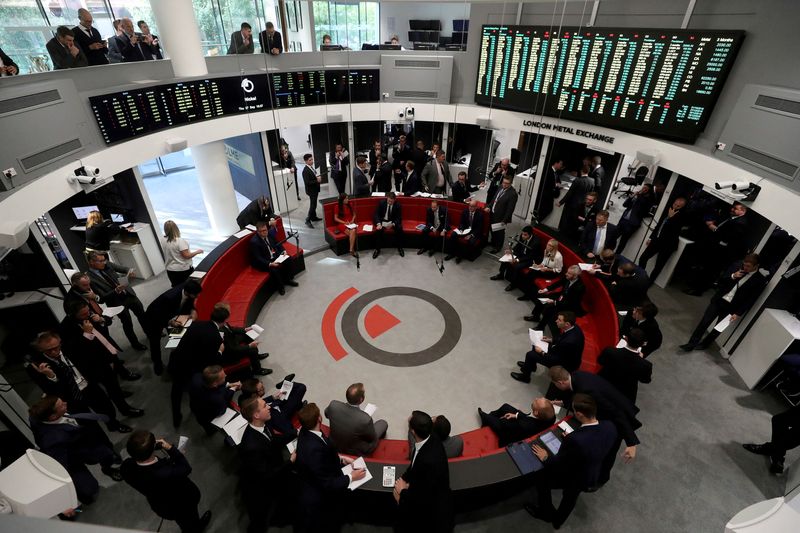By Pratima Desai
LONDON (Reuters) - Hedge fund Elliott Associates and Jane Street Global Trading are suing the London Metal Exchange for up to $500 million after the LME cancelled nickel trades on March 8 when prices soared to record highs above $100,000 a tonne in chaotic trade.
The nickel trading debacle is the biggest crisis to hit the world's oldest metals forum in decades. Suspension of trading on March 8 left consumers and producers without key benchmark prices and damaged the 145-year-old LME's reputation.
Sources familiar with the events around the suspension said that if the LME hadn't cancelled the trades, some of its members would not have been able to pay their margins, known as default.
"Decisions were made in part due to our conclusion that the significant price movements during early hours trading activity on 8 March had created a systemic risk to the market, including in relation to margin calls," an exchange spokesperson said in response to a request for comment.
The spokesperson added margin calls would have hit levels "far in excess of those ever experienced in the LME market".
Following are details about how margin calls work, what happened on March 7 and 8 and what happens if a LME member fails to pay margin calls.
HOW DO MARGIN CALLS WORK?
Margin calls are deposits of cash or collateral with the exchange's clearing house, LME Clear, to cover potential losses in a member defaults.
Initial margin is a percentage of the purchase price that members must deposit with LME Clear for their trades.
Variation margin is the difference between the price originally bought or sold at and the current market price or closing price. As prices move up or down the variation margin has to be topped up or cash is returned.
LME Clear calls for variation margin every hour during the day, to be settled within an hour. It also calls for variation margin at close of business, to be settled by 0900 London time the next working day.
WHAT HAPPENED?
Short position holders sell metal contracts on the LME and long positions buy.
The problem was Tsingshan Holding Group, China's largest private stainless steel producer, couldn't immediately get the cash it needed to meet margin calls on a large short position when nickel prices soared in early March.
Tsingshan can't trade on the LME as it is not a member.
Its short position would have been built via a LME member using over the counter (OTC) trades -- bi-lateral agreements between LME members and their clients.
Members that traded with Tsingshan would have held long positions, which can be netted off against other client positions or hedged by selling contracts on the LME, on which they would pay margin calls.
Tsingshan would have had a credit line with members to pay its margins. Once that credit was exhausted, members would have asked for cash.
WHAT HAPPENS IN A DEFAULT?
In the event of a member default, LME Clear takes over the member's portfolio and sells it.
Any losses are initially offset against margins paid by the defaulter, then by LME Clear's default fund, which in March amounted to $1.1 billion. Separately, LME Clear would contribute an additional 25% of its regulatory capital in the event of a default to cover the losses.
If there isn't enough money in the default fund, the clearing house and members have to keep topping up the fund until all the losses are covered.
SIZE OF POTENTIAL LOSSES?
Tsingshan had a short nickel position totalling around 300,000 tonnes at prices between $18,000 and $19,000 a tonne in early March, according to one source familiar with the matter.
How much of that was on the LME is not known and Tsingshan sold down some of its position on March 7. However, using the 300,000-tonne figure gives an idea of the scale of losses.
On March 4, LME Clear raised initial margin requirements for nickel by 12.5% to $2,250 a tonne effective at close of business March 8, which meant Tsingshan would have had to deposit another $75 million taking the total to $675 million.
Tsingshan would also have had to add $5.7 billion to its variation margin -- 300,000 tonnes multiplied by $19,159, the difference between the closing price on March 4 and 7.
This would have taken the variation margin Tsingshan needed to deposit on March 7 to $8.8 billion -- 300,000 tonnes multiplied by $29,578, the difference between the closing price on March 7 and costs between $18,000 and $19,000 a tonne.

On March 8, nickel trading was halted at $80,000 a tonne. At this level, if the LME hadn't cancelled the trades, Tsingshan would have had to find another $9.6 billion.
(This story refiles to clarify LME Clear's contribution in event of default)